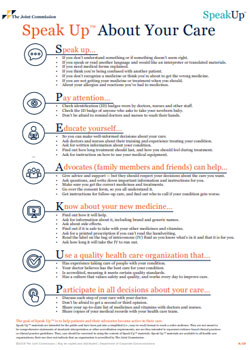Throughout history, the dialogue surrounding health care advocacy has evolved in numerous ways, offering a plethora of opportunities for individuals to engage not only with their own health care providers but also with the broader system that governs the well-being of countless patients. This evolution underscores a vital importance: the necessity of speaking up for one’s health care and, by extension, the health care of others. There exists a plethora of reasons why patients and caregivers alike ought to cultivate an assertive stance when it comes to navigating the complex tapestry of health care. Indeed, a shift in perspective is imperative, fostering an environment where everyone feels empowered to articulate their thoughts and concerns freely.
The cornerstone of effective communication in health care lies in the recognition of the power dynamics at play. Patients often find themselves at the mercy of clinical hierarchies, where physicians wield considerable authority. However, fostering a paradigm of egalitarianism can catalyze transformative changes. It is vital to acknowledge that patients possess invaluable insights about their own bodies, experiences, and treatment preferences. By formulating an articulate voice, individuals can contribute meaningfully to their care plans, elevating the quality and efficacy of health interventions. Thus, the call to action is clear: patients and visitors must engage actively, adopting a posture of assertiveness that demands acknowledgment and respect from their health care providers.
Moreover, one of the fundamental reasons for advocating a proactive approach within the health care system involves the diverse array of challenges that patients frequently encounter. From misdiagnoses to ineffective treatments, the consequences of passive acceptance can be dire. When patients remain silent, they inadvertently surrender their autonomy, allowing others to make pivotal decisions on their behalf. Such submission can result in an erosion of trust and a disconnect between the patient and provider. Hence, articulating concerns regarding one’s treatment is not merely an act of defiance; it embodies a fundamental right to quality care that should be ubiquitous across all medical settings.
Equally imperative is the notion of collective advocacy—speaking up not just for oneself, but for fellow patients and vulnerable populations who may lack the agency or resources to effectuate change. In a world rife with health disparities, voicing concerns about inequitable treatment options or advocating for marginalized communities can engender profound systemic shifts. By underscoring issues such as access to care, quality of treatment, and ethical considerations, the ripple effect of proactive advocacy can resonate far beyond the individual, effectuating positive change on communal and national levels.
To achieve this ambitious transformation, fostering a culture of dialogue must be prioritized. Health care environments should embrace the principle that communication is a two-way street. An atmosphere where patients feel welcome to express their thoughts and assert their needs enhances the entire care experience. Providers must greet each patient interaction with receptiveness, demonstrating not only respect but also a commitment to collaborative care. Training programs that prioritize communication skills and empathy among health care workers can precipitate significant advancements in patient relationships.
Amidst this discourse, it is also essential to examine the myriad forms of communication that can facilitate advocacy. Written correspondence—be it emails or formal letters—often serves as a powerful medium for articulating concerns. A well-crafted message can transcend emotional barriers, ensuring that thoughts are conveyed with clarity and intentionality. Moreover, utilizing social media as an advocacy tool offers unparalleled reach, allowing individuals to share their experiences and mobilize support for systemic reforms. The immediacy of online platforms fosters an environment where voices can convene, creating alliances that amplify collective concerns.
However, organizations dedicated to health care advocacy must not overlook the importance of accessibility in ensuring that every voice is heard. Initiatives aimed at dismantling linguistic and cultural barriers can significantly enhance inclusivity within patient populations. By providing resources in multiple languages and employing cultural competency training for health care providers, systems can promote equitable access and ensure that every patient feels empowered to speak up.
The reverberations of speaking up extend into the realm of animal care as well. The interconnection between human and animal well-being manifests in the advocacy for animal rights within health care settings. Just as patients deservedly assert their voices, advocates must also stand firm against cruelty and neglect inflicted upon animals. Many individuals remain unaware of the ethical dilemmas that pervade the animal care industry, making it essential to shine a light on these pervasive issues. Advocacy for animal well-being is not merely an echo of the human experience; it’s a clarion call for compassion and ethical treatment of all beings.
In summation, the rallying cry for patients and advocates alike is to embrace a proactive role in health care dialogue. By navigating the complexities of the system with assertiveness and courage, individuals can catalyze change that reverberates across personal narratives and societal structures. The ongoing challenge lies not in merely acknowledging the need to speak up but in actively fostering environments wherein these conversations may flourish. Advocacy, therefore, transcends mere action; it is a profound commitment to equity, compassion, and the unwavering pursuit of health care that honors the inherent dignity of all individuals and living creatures.










